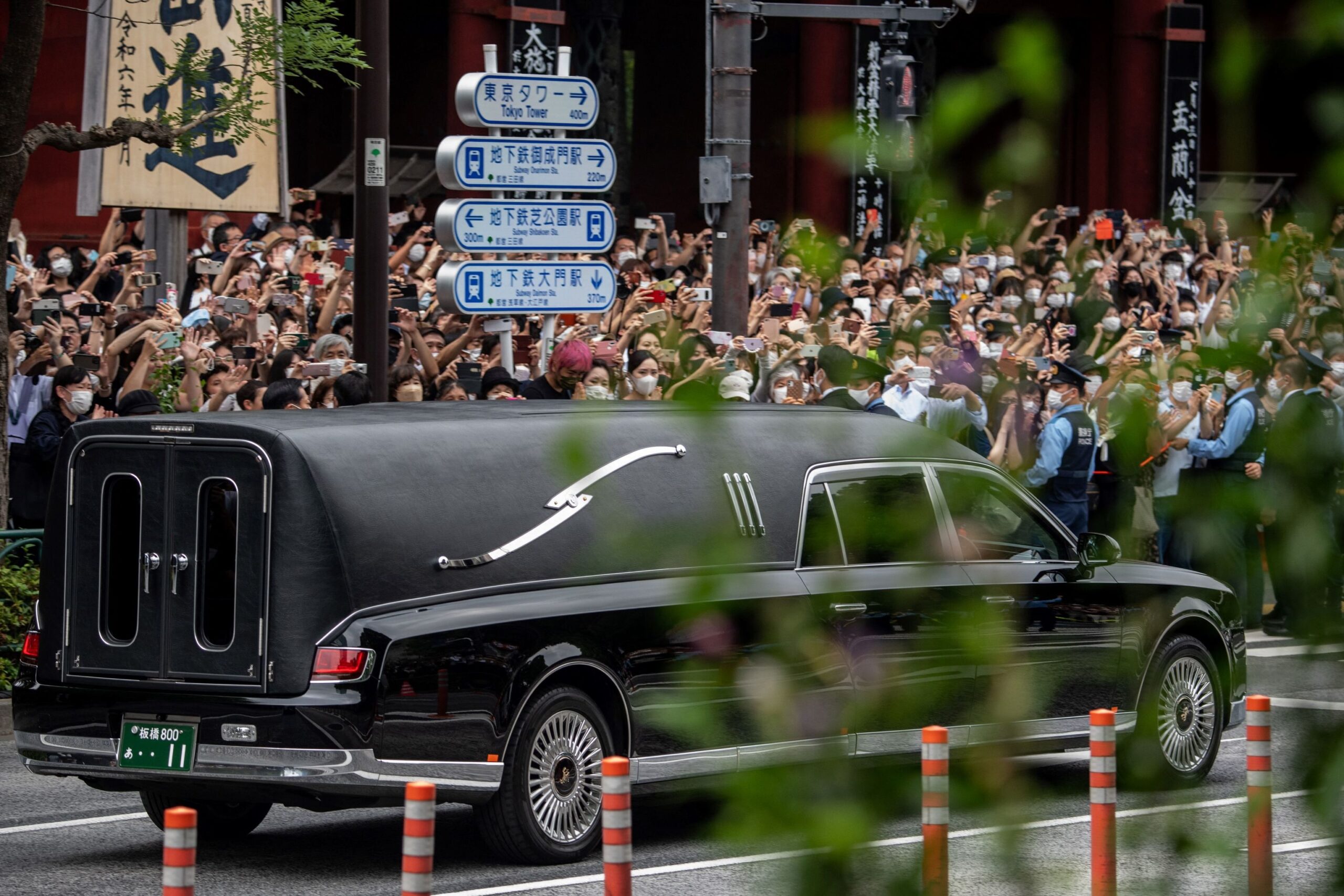Thousands of people gathered on the streets of Tokyo on Tuesday to watch the funeral procession of former Japanese Prime Minister Shinzo Abe, who was assassinated last week, pass by after a private funeral held in the afternoon at a Buddhist temple.
Although the funeral ceremony was only for family and friends, long lines of people dressed in black have formed in front of the Zojoji temple to bid farewell to the prime minister who was in power the longest in Japan.
“I can’t bear the sadness, so I came to leave flowers and pray,” consultant Tsukasa Yokawa, 41, told AFP, calling Abe “a great prime minister.”
Abe was shot last Friday during a campaign event in the city of Nara, two days before the elections for the Upper House of Parliament, in which his party secured its majority on Sunday.
The suspect in the crime, 41-year-old Tetsuya Yamagami, arrested immediately after the crime, has told police that he attacked him because he believed Abe was linked to a religious organization that allegedly harmed his family.
“It’s despicable,” said Yuko Takehisa, a nurse who has also seen the procession pass. “She could have done more to prevent it,” she has stated, noting that “nobody reported Yamagami” to the police despite reports that she had tried a homemade weapon before the attack.
After the tribute, the procession with the remains of Abe has moved to the emblematic places of the capital and to the symbols of power such as the residence of the prime minister, known as Kantei, and the seat of Parliament.
Outside the buildings, officials and high officials stood grim-faced, bowing as a sign of respect.
Abe’s widow, Akie, has sat in the front seat of the hearse with her husband’s headstone bearing his posthumous name, according to Buddhist tradition. Akie returned the bows during the courtship.
All along the route, lines of people offered their prayers and took pictures of Abe’s last ride.
Japanese Defense Minister Nobuo Kishi, Abe’s brother, described the attack as a “terrorist act” on Tuesday. “I have lost my brother, and Japan has lost an irreplaceable leader,” he has declared on Twitter. “My brother loved Japan and was risking his life for politics and to protect this nation,” he added.
Satoshi Ninoyu, president of the National Public Security Commission, the entity in charge of the police, has promised this Tuesday a thorough review of possible security flaws.
Local police have admitted problems in their security program for Abe, who was approached from behind and attacked in broad daylight.
In the suspect’s house, police have found pellets and other possible components to make weapons like the one used in the attack, Japanese media reported, citing anonymous sources.
Yamagami reportedly spent three years in the Japanese navy and has reportedly told investigators that his mother made a large donation to a religious organization, leaving the family in financial trouble.
The Unification Church, a religious movement founded in the 1950s in Korea known as “the Moon sect,” said on Monday that Yamagami’s mother was a member, but did not refer to the donations she may have made.
Abe’s murder has generated surprise and outrage in Japan and the world, as well as a wave of messages of condolences.
Foreign Minister Yoshimasa Hayashi said on Tuesday that more than 1,700 messages of condolences were received from more than 259 countries, territories and international entities.
The US Secretary of State, Antony Blinken, has traveled on an unscheduled visit to Tokyo to pay tribute to Abe, whom he has described as “a man with vision”.
Taiwanese Vice President William Lai has also made a private visit to Tokyo, harshly criticized by the Chinese government, which has accused the island’s government of using the situation as “an opportunity for political manipulation.”
Abe came from a political family and became the youngest post-war prime minister when he first took office in 2006 at age 52. He resigned in 2020 at the end of his second term, after suffering health problems.
His nationalist visions created division, especially his will to reform the pacifist constitution of Japan, and, in addition, he faced a series of scandals, including accusations of favoring his relatives.
Others have praised him for his economic strategy based on expansionary monetary policy, fiscal stimulus and structural reforms, dubbed ‘Abenomics’ by the media.
Many have also highlighted his efforts to put Japan on the world stage, including the close relationship he cultivated with former US President Donald Trump.
Conforms to The Trust Project criteria
















